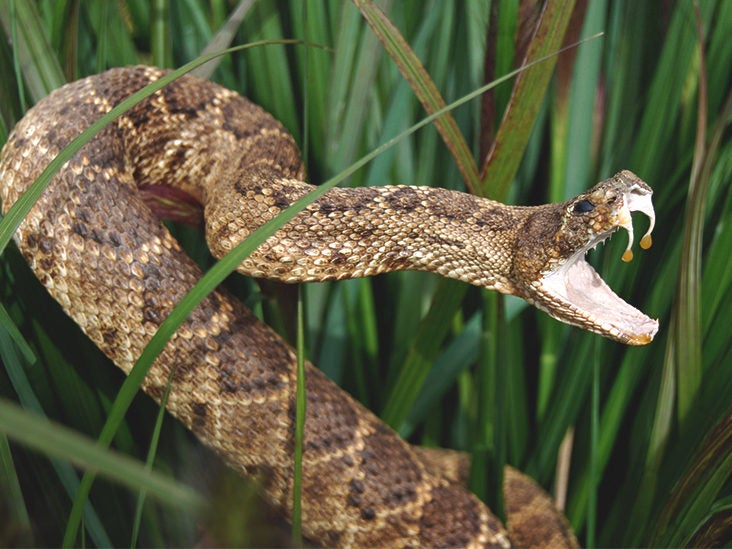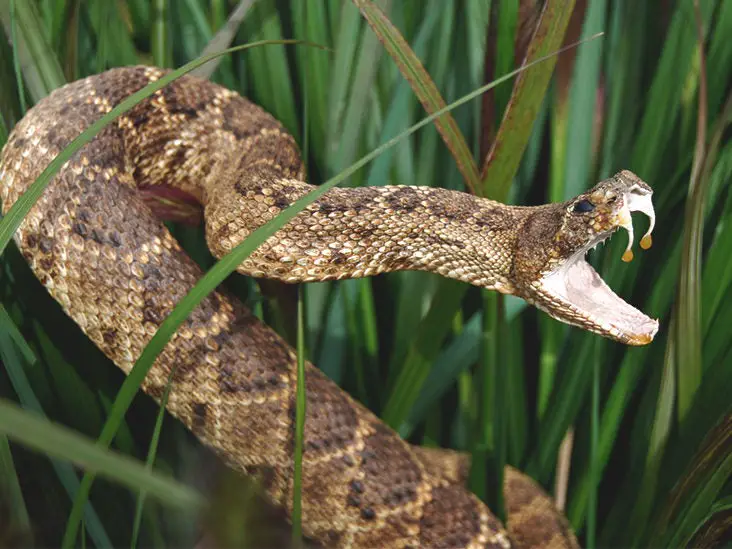Rattlesnakes are fascinating creatures that have been the subject of many myths and legends over the years. One of the most intriguing aspects of these snakes is their venom. This powerful substance can have a wide range of effects on the human body, from mild discomfort to life-threatening symptoms.
If you’ve ever been curious about the true nature of rattlesnake venom, you’re in the right place. In this article, we’ll explore the different types of venom produced by rattlesnakes, as well as the various ways in which it can impact your body. So, sit back and get ready to learn more about one of the most fascinating and complex substances found in nature.
Rattlesnake venom can cause a variety of symptoms depending on the amount and type of venom injected. The venom contains enzymes that break down tissue, causing pain, swelling, and bruising. It also affects the nervous system, causing dizziness, weakness, and difficulty breathing. In severe cases, it can lead to organ failure and death.

What Does Rattlesnake Venom Do to You?
Rattlesnakes are one of the most venomous snakes in the world. Their venom is composed of a complex mixture of proteins and enzymes that can cause severe damage to a human body. When bitten by a rattlesnake, the venom enters the bloodstream, and within minutes, it can start to take effect. In this article, we will discuss the effects of rattlesnake venom on the human body.
1. Pain and Swelling
The first and most immediate effect of rattlesnake venom is pain and swelling around the bite area. This is caused by the venom’s ability to break down the tissues and cells around the bite. The pain can be severe and can last for days, depending on the severity of the bite. The swelling can also be extensive and can spread to other parts of the body if left untreated.
The best way to manage pain and swelling is to immobilize the affected limb and seek medical attention immediately. The doctor may prescribe painkillers, anti-inflammatory drugs, or even intravenous fluids to manage the symptoms.
2. Bleeding and Bruising
Rattlesnake venom can also affect the blood-clotting mechanism of the body, leading to bleeding and bruising. This is caused by the venom’s ability to interfere with the platelets and clotting factors in the blood. The bleeding can be internal or external, and can be life-threatening if not managed promptly.
Treatment for bleeding and bruising includes administering antivenom, blood transfusions, and other medications that can help to restore the blood-clotting mechanism.
3. Nausea and Vomiting
Rattlesnake venom can also affect the digestive system, leading to nausea and vomiting. This is caused by the venom’s ability to disrupt the normal functioning of the stomach and intestines. The nausea can be severe, and vomiting can lead to dehydration and electrolyte imbalances.
The best way to manage nausea and vomiting is to stay hydrated and seek medical attention immediately. The doctor may prescribe antiemetic medications to manage the symptoms.
4. Respiratory Distress
Rattlesnake venom can also affect the respiratory system, leading to respiratory distress. This is caused by the venom’s ability to cause swelling and inflammation in the airways. The respiratory distress can be severe, and in some cases, can lead to respiratory failure.
The best way to manage respiratory distress is to seek medical attention immediately. The doctor may prescribe oxygen therapy, bronchodilators, or even intubation and mechanical ventilation to manage the symptoms.
5. Paralysis
Rattlesnake venom can also affect the nervous system, leading to paralysis. This is caused by the venom’s ability to block the nerve impulses that control muscle movement. The paralysis can be partial or complete, and can be life-threatening if it affects the muscles that control breathing.
The best way to manage paralysis is to seek medical attention immediately. The doctor may prescribe antivenom, muscle relaxants, or even intubation and mechanical ventilation to manage the symptoms.
6. Kidney Damage
Rattlesnake venom can also affect the kidneys, leading to kidney damage. This is caused by the venom’s ability to cause damage to the blood vessels in the kidneys. The kidney damage can be severe, and in some cases, can lead to kidney failure.
The best way to manage kidney damage is to seek medical attention immediately. The doctor may prescribe intravenous fluids, medications to manage blood pressure, or even dialysis to manage the symptoms.
7. Cardiac Complications
Rattlesnake venom can also affect the heart, leading to cardiac complications. This is caused by the venom’s ability to cause damage to the heart muscle and disrupt the normal electrical activity of the heart. The cardiac complications can be severe, and in some cases, can lead to heart failure.
The best way to manage cardiac complications is to seek medical attention immediately. The doctor may prescribe medications to manage blood pressure and heart rate, or even administer intravenous fluids to manage the symptoms.
8. Psychological Effects
Rattlesnake venom can also affect the psychological well-being of a person. This is caused by the trauma of being bitten by a venomous snake and the fear of dying. The psychological effects can be severe and can lead to anxiety, depression, and post-traumatic stress disorder.
The best way to manage psychological effects is to seek medical attention immediately. The doctor may prescribe medications to manage anxiety and depression, or even refer the patient to a mental health professional to manage the symptoms.
9. Benefits of Rattlesnake Venom
Despite its harmful effects on humans, rattlesnake venom has several benefits. The venom contains proteins and enzymes that have been used to develop drugs for various medical conditions, including hypertension, heart disease, and cancer. The venom has also been used in research to develop new drugs and treatments for various diseases.
10. Rattlesnake Venom vs. Other Snake Venom
Rattlesnake venom is not the only venom that can cause harm to humans. Other venomous snakes, such as cobras, vipers, and mambas, also have venom that can cause severe damage to the human body. However, rattlesnake venom is unique in its composition and has been the subject of extensive research due to its potential medical benefits.
In conclusion, rattlesnake venom can cause severe damage to the human body, leading to pain, swelling, bleeding, bruising, nausea, vomiting, respiratory distress, paralysis, kidney damage, cardiac complications, and psychological effects. However, despite its harmful effects, rattlesnake venom has several potential medical benefits and has been the subject of extensive research. If you are ever bitten by a rattlesnake, seek medical attention immediately to manage the symptoms and prevent further damage.
Frequently Asked Questions
If you encounter a rattlesnake, it is important to know what the effects of their venom can have on you. Here are some common questions and answers regarding rattlesnake venom:
How does rattlesnake venom affect the body?
Rattlesnake venom is composed of various proteins and enzymes that can have a range of effects on the body. It can cause symptoms such as swelling, pain, and tissue damage at the site of the bite. The venom can also affect the nervous system, leading to symptoms such as dizziness, confusion, and seizures.
In severe cases, the venom can cause life-threatening complications such as respiratory failure, kidney failure, and cardiac arrest. However, not all rattlesnake bites result in severe symptoms, and the severity of the symptoms can vary depending on factors such as the amount of venom injected and the location of the bite.
How quickly does rattlesnake venom take effect?
The effects of rattlesnake venom can take anywhere from minutes to hours to become apparent. The severity of the symptoms can also vary depending on the amount of venom injected and the location of the bite. In some cases, symptoms may not appear until several hours after the bite has occurred.
If you have been bitten by a rattlesnake, it is important to seek medical attention as soon as possible, even if symptoms have not yet appeared. Treatment for a rattlesnake bite is most effective when administered early on, before the venom has had a chance to spread throughout the body.
Can rattlesnake venom be fatal?
Yes, rattlesnake venom can be fatal in some cases. The severity of the symptoms and the risk of death depend on factors such as the amount of venom injected, the location of the bite, and the health of the person who was bitten.
However, it is important to note that not all rattlesnake bites are life-threatening, and fatalities are relatively rare. With prompt medical attention and appropriate treatment, most people who are bitten by a rattlesnake make a full recovery.
How is rattlesnake venom treated?
Treatment for a rattlesnake bite typically involves administering antivenom, which is a medication that neutralizes the venom and helps to prevent further damage to the body. Other treatments may include pain management, wound care, and supportive care for any complications that may arise.
If you have been bitten by a rattlesnake, it is important to seek medical attention as soon as possible. Do not attempt to suck out the venom or apply a tourniquet, as these methods can actually make the situation worse.
How can rattlesnake bites be prevented?
The best way to prevent a rattlesnake bite is to avoid encounters with rattlesnakes in the first place. This can be done by staying on designated trails when hiking, wearing protective clothing and footwear, and being alert and aware of your surroundings.
If you do encounter a rattlesnake, it is important to give it plenty of space and not attempt to handle or capture it. Most rattlesnake bites occur when people attempt to interact with or interfere with the snake in some way.
What Happens if a Rattlesnake BITES You?
In conclusion, rattlesnake venom can have a variety of effects on the human body. The venom can cause swelling, pain, and even death if not treated properly. However, it is important to note that not all rattlesnake bites will result in venom injection.
If you encounter a rattlesnake, it is best to give it space and avoid disturbing it. If you are bitten, seek medical attention immediately. Antivenom treatments are available and can greatly improve your chances of recovery.
Remember, prevention is key. Stay aware of your surroundings when hiking or spending time outdoors, wear protective clothing and footwear, and avoid walking in areas where rattlesnakes are known to inhabit. With proper precautions and quick action, you can reduce your risk of being affected by rattlesnake venom.


